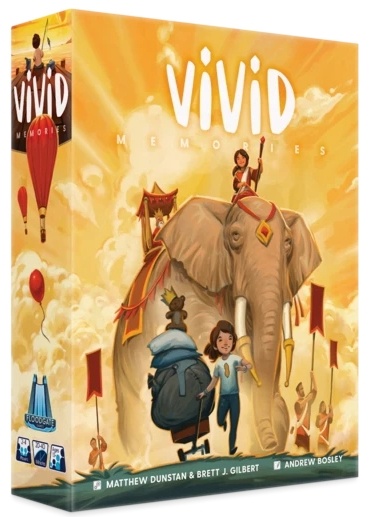Vivid Memories
Publisher: Floodgate Games
Release Date: Q4 2021
MSRP: $55.00
Creator(s): Matthew Dunstan, Brett J. Gilbert (designers); Andrew Bosley (artist)
Format: Boxed game with board, tiles and cards
Number of Players: 2-4
Playing Time: 30-45 mins.
Age Rating: 13+
ICv2 Rating: 4 Stars out of 5
First off, the artist for this game was a very important contributor to its quality. The art used on the components is universally very good, and the component quality is excellent.
Second, this may be the strangest game using a mechanic of drafting that you’ll encounter, since what you are drafting are beautiful little tokens that represent fragments of dreams and/or memories. If the artwork wasn’t so riveting, one might just ignore the theme, but it’s right there in front of you, as a player, the whole game.
This not a light party game. The rules are very easy, and players are supported by very good player aids. This is important because the game uses a complex but visually clear system of icons, apparently because it’s being released in both French and English editions. Minimizing text on the components means fewer things needed to be printed in two different editions. As it is, I think that only the box, rules and player aids needed to be done twice. The thing is, the length may be deceptive, because it’s actually a mid-level game in terms of complexity of play. It’s just a short mid-level game. The players always have to be thinking ahead, with both main plans and reserve plans, because your options are limited to what is available to draft on your turn. This can make a large difference in what a player can complete, and if this was a longer game, that would weigh against it as a luck factor. Because it’s a short game, it will be easy to take a “there are no green memories available” result less seriously if you really needed green memory fragments to win the game.
In a two-player game, there will be eleven tokens each of five different colors put into a bag for random drawing. Over the course of the game, only 48 of these 55 will be drawn. For three or four players, the number of tokens increases, but so does the competition for what you want. On each drafting turn, you may take a single token, two of the same color, or three, but made up of one each of three different colors. In addition, you are limited as to where you may draft them from on the display, and the extra tactical level of obtaining tiles as you obtain the tokens makes this aspect very tactical. When you empty a tile of tokens, you gain the tile, which can give you extra benefits, but gets in the way of some of your actions until you use it to score points. If you can’t use it, you’re stuck with it in the way, so be careful what tiles you take! The tiles can make a difference in your scoring, enough to swing a close game. Each player has a color of token that will benefit them with bonus points at the end, but there are five colors, and thus one or more colors will not give anyone a bonus.
Placing the tokens on your player board is the key, as each player has to choose between creating patterns of tokens in various hexagonal spaces, or stringing a color out to connect places at the edge of the board, since the two often conflict, but both provide victory points.
Other than being a bit heavier than it looks, the game’s only weakness is that there is at least a small risk of analysis-paralysis in making decisions about placing tokens, or using actions to move them later. Each game is only three “big” turns long, but each one has a several actions and a scoring round. If the designer and publisher do an expansion of some kind, the obvious candidate for inclusion is the tiles, since more variety there would be worth paying for. What’s in this set is very good, but the tile art is great, and some new tiles might give the designer some wiggle room to create new scoring possibilities.
There was a deluxe version available on Kickstarter, but the retail version had everything you actually need except, oddly, for a small bag for the tokens used to keep score. For most gamers, that will only take a moment to remedy.
The graphics and printing are outstanding, but the printing of symbols on the player board edges is a little faint, and on the tiles the blue is dark and purply compared to the fragment tokens. Both of these can interfere with game play at first, but players can learn to work around both of these things after examining the board and tiles for a minute.
The game takes a few minutes to teach, less than an hour to play, but for players who enjoy the numerical and visual puzzles that lead to scoring points, this will be a fun game that will be enjoyed for a while.
—Nick Smith: Library Technician, Community Services, for the Pasadena Public Library in California.
Source: ICV2





